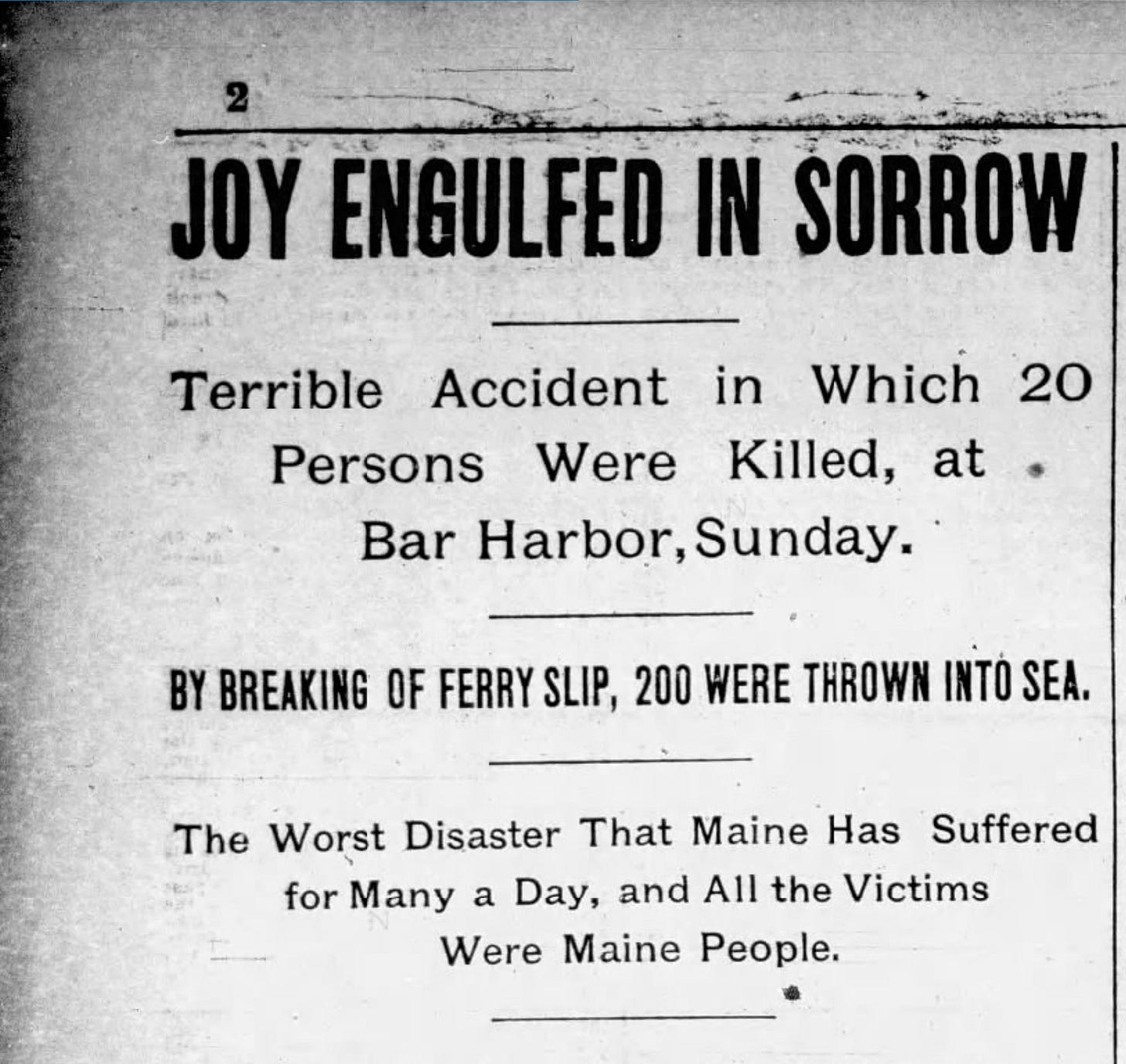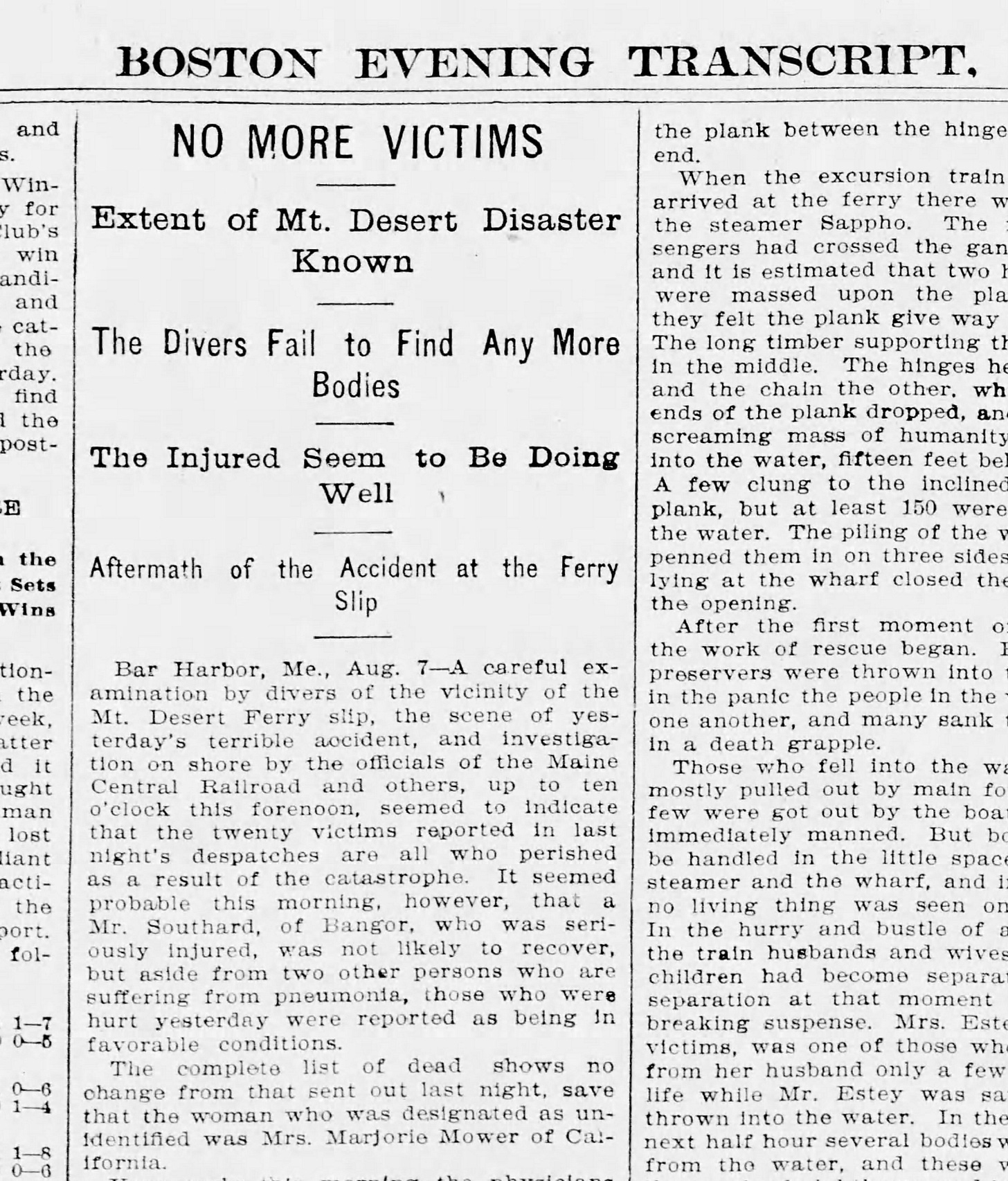“I never witnessed, nor desire to see, such a terrible affair again.”
The Disaster of the Mt. Desert Ferry Wharf Killed Twenty
BAR HARBOR—In August 1899 one of the biggest disasters hit the Mount Desert Island community when twenty people died and according to the Portland Daily Press, “a score or more were badly hurt” when the Mt. Desert Ferry’s wharf collapsed as people were boarding it, heading to the island.
Author and historian Mac Smith detailed aspects of the disaster to listeners at the Jesup Memorial Library, Thursday night. Smith’s book, Disaster at the Bar Harbor Ferry, details the events of the August 6 disaster as a crowd of people waited to board the Sappho.
Smith is a former news reporter for the Bar Harbor Times and Navy veteran of the First Gulf War. He has a flair for telling a story both on the page and in front of a podium, a trait he proved once again at the Jesup.
Smith recounted that the day of the disaster was Sunday and it was beautiful out. “It’s special upon special upon special,” Smith said. The Atlantic fleet was visiting Bar Harbor for a week, and it was its first visit since the victory in the Spanish-American War. An excursion train with eleven cars and two engines headed to Hancock to get to the ferry to go to Bar Harbor and see the fleet.
“There’s this general atmosphere of gaiety,” Smith said. The train arrives in Ellsworth, where it picks up another 400 people. “When they get to Mount Desert Ferry, there’s not going to be enough room on the Sappho for all of them.”
Or that’s what they thought. The Sappho could ferry 1,200 people. According to the president of the railroad, there were 968 people on the train. Another boat, the Sebanos, was there and it could hold 400.
“Everybody throughout the state knew somebody who was on that excursion train,” Smith said.
There’s already people embarking on the Sappho as the train comes into view. People see the precious few seats being taken, and before the train comes to a stop, people are jumping off, the train, he said. They rushed to the 37-foot-long gangplank that didn’t go out into the water, but ran along the shore.
It was high tide. There were 1,300 people anxious to get on the ferry. “There is the wildest kind of shoving to get on the gangplank,” he said. And, at some point, people in the middle of the gangplank are starting to get pushed.
“They scream, “Stop you’re pushing. Stop you’re pushing,’” Smith said.
There’s a snap like the breaking of a chain. It’s followed by a woman’s scream. A section of the ten-foot-wide gangplank gave out.
“So these 200 people on the gangplank are falling into a very small, enclosed pen,” Smith said.
The people in the water are screaming, but others are silent. People in the back of the crowd don’t know what’s happening, and think it’s part of the fun, and they push 50 more people into the water.
The rescue begins. Boards are yanked up. People are knocked into the water after being hit in the head. Two men organized a more serious effort. The captain and train conductor started an intensive rescue.
Chester Robbins, editor of the Old Town Enterprise, had fallen in too, but he managed to get out, and he handed boards to people still in the water to help them stay afloat until a rope was fastened and pulled the people out.
“We’re in Hancock, Maine and we have 250 people who have been badly injured,” Smith said. It was remote. It wasn’t a good situation.
The quickest transportation was horse and buggy. Luckily, four doctors were on the train. Two fell in the water, but one must have gotten out and three were able to give assistance. A handful of other people arrived to assist.
People went to a nearby kitchen to warm up. Rescuers took people with physical injuries to the Bluffs Hotel. To try to revive people, they rolled them over barrels, back and forth. There were a bunch of flour barrels that had just come in and those were used for CPR.
“Bar Harbor and Mt. Desert Ferry had a symbiotic relationship in the time gone by,” Smith said and the people in Bar Harbor were waiting for the ferry that was incredibly late, worrying and wondering what was happening.
Why did the wharf break?
“The reason is on page 130 of this book. When you read this reason you’re going to cringe, you’re going to cringe, you’re going to cringe,” Smith teased.
The Portland Daily Press said that the ferry slip bolts were pulled through. There were no washers used with those bolts. Without those bolts, the wood wasn’t strong enough to hold the people on it. Right before the break, part of the packed crowd of about 200 people on that gangplank surged backwards, while another part surged forward.
“This is a damn good story,” he said.
Frank Sweetser and Edmund Phinney Greenough both clerked together at the Maine Central Office in Bangor. They headed to Bar Harbor on that day. Both fell into the water. Greenough made it out after 15 minutes. Sweetser died.
“The first I felt of anything wrong was a sinking sensation and then I struck the water, going down, and it seemed as though I would never reach bottom. About this time I felt that I must get a breath of air and took a little short gasp and did not get any water in my mouth. Then I opened my eyes to find I was on top of the water.
“I got hold of a plank to aid me and looked around to see what I could do for others. Then I realized the magnitude of the accident. Some of the men acted like madmen, while most of them did everything they could to help those who were not able to help themselves.
“A large woman was hanging to a rope, then another lady was pushed to the rope by a gentleman whom I did not know. He was a blessing to a great many of the people who would surely have been drowned if it had not been for his heroic efforts,” Greenough said.
“After he helped the women to the rope and turned to help another, a large, able-bodied fellow grabbed hold of the two women who were holding on and attempted to climb up over them to the top of the pier.”
Greenough managed to help two exhausted women. Greenough dried himself in the boat’s engine room, found a change of clothes in Bar Harbor, and looked for his friend. He went back to Hancock and learned that Frank Sweetser had drowned.
“I never witnessed, nor desire to see, such a terrible affair again,” Greenough said. “It was simply beyond explanation.”
FOR MORE INFORMATION, CHECK OUT MAC’S BOOK.










Loved this story and have re-read it already. Well done Carrie.